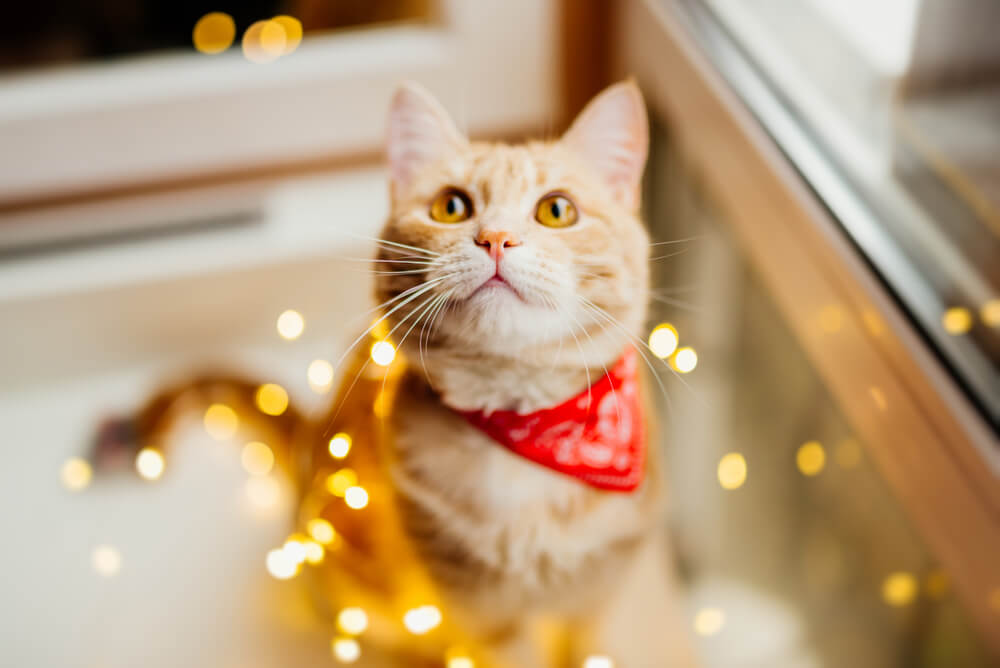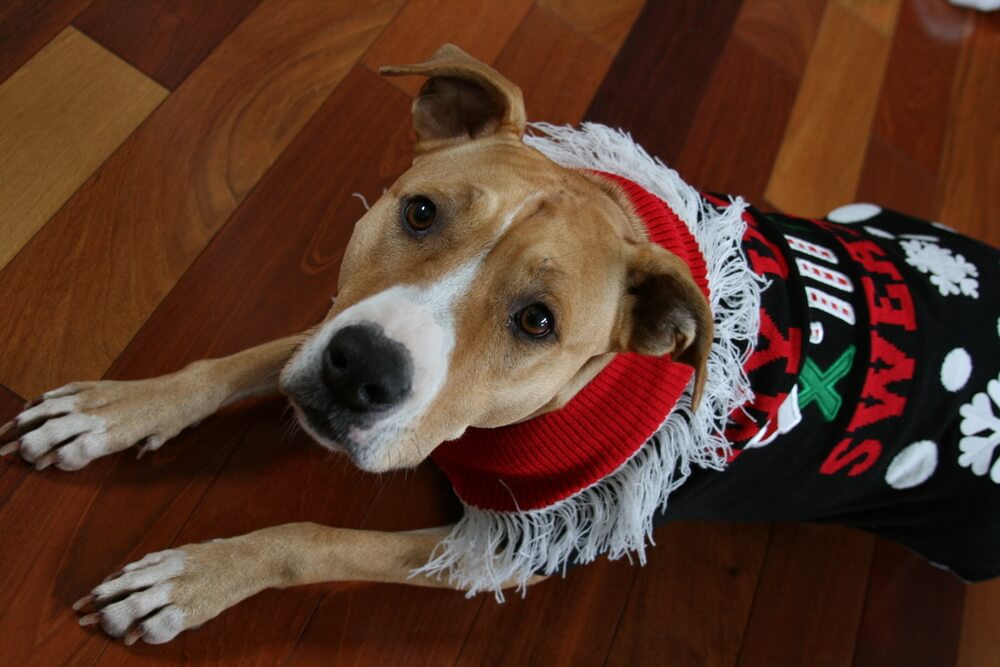
Sparkling lights and streets adorned with surfing Santas remind us that the holidays are here. Although celebrations may be smaller this year, the festive traditions of holiday music, decorating homes, and preparing plenty of sweets and treats remain the same. Holiday celebrations are extra special when we include our four-legged family members, but ensure your pets stay safe this holiday season. Take your Towne Centre Animal Hospital veterinary team’s advice and avoid these 12 pet holiday hazards.
#1: Holiday foods and sweets toxic to pets
Many popular holiday meals contain ingredients that are harmful to our furry friends. Rich, fatty foods, such as fried or marinated meats, are difficult for pets to digest and can cause gastrointestinal (GI) distress and inflammation, including pancreatitis, a potentially deadly inflammatory condition that can cause vomiting, diarrhea, lethargy, and dehydration. Never feed your pet any of the dangerous foods included on this list.
#2: Alcohol in food or drinks
Festive cocktails, candies, and fruit cakes containing alcohol are toxic to pets. Never share any food or drink that contains alcohol with your pet, because as little as one ounce of alcohol can be deadly to small dogs or cats.
#3: Scented candles and pet-toxic potpourri
Evergreen- and peppermint-scented candles help create a holiday home, but many scented candles and potpourri contain essential oils toxic to pets, causing coughing, breathing difficulty, seizures, and possible death. Avoid using candles, votives, or potpourri containing the essential oils listed here. Also, never leave your pets unsupervised around burning candles or fires, to prevent house fires or burned paws.
#4: Cats and tinsel and ribbon
Our feline friends often mistake shiny tinsel and ribbon for toys, but tinsel commonly causes cat holiday emergencies. Swallowing tinsel, ribbon, or string can result in an intestinal blockage that may require surgery, so ensure all tinsel and ribbons are high on the tree, out of paws’ reach.
#5: Dangling ornaments and pets
Playful pets are often attracted to dangling, shiny ornaments hanging from the tree. Ensure that all fragile and handmade ornaments are placed high and out of pets’ reach to prevent injury, such as cut paws, from broken ornaments, or a painful stomach from ingested pieces. Handmade salt dough ornaments are especially toxic to pets, and can cause GI upset or salt toxicity, which can be deadly without treatment.
#6: Christmas trees that can fall on pets
A curious pet may investigate your live or artificial indoor Christmas tree, or your cat may mistake the tree for a large scratching post. Ensure that trees are secured to a ceiling or doorway to prevent the tree from tipping and injuring pets.
#7: Christmas tree water
If you traditionally have a live Christmas tree, never use water additives in the tree stand. Pets can mistake tree water for their own personal water dish, and drinking the additive-laden water can lead to vomiting, diarrhea, and dehydration.
#8: Lights and wires that can tangle up pets
Ensure that all decorative light wires and cords are out of pets’ reach to avoid an unexpected visit to the veterinary emergency hospital. Chewing or swallowing cords can lead to serious injury, including oral burns, electric shock, or GI distress or blockage.
#9: Batteries and small toys
Keep all batteries and small toys out of paws’ reach. Most batteries contain zinc, which is toxic to pets if ingested, and can cause GI distress, anemia, seizures, and sometimes death. Beware of batteries in unexpected places such as greeting cards or cameras. Small children’s toys may also tempt mischievous pets, who can easily swallow them, which can cause intestinal damage or blockage that requires surgical removal.
#10: Pet-toxic holiday plants and flowers
Many festive holiday plants and flowers are dangerous if eaten by our four-legged friends. Prior to gifting friends, family, or yourself with a holiday plant or arrangement, ensure they do not contain these pet-toxic plants:
- Lilies — Eating only a small amount of any part of the lily plant, including the pollen and leaves, can cause drooling, vomiting, and decreased appetite, and can lead to kidney failure. Cats are especially susceptible.
- Holly — Eating the sharp leaves can injure a pet’s mouth, and cause vomiting, diarrhea, lip smacking, head shaking, and anorexia. Large amounts could also lead to intestinal blockage.
- Mistletoe — Mistletoe can cause vomiting, diarrhea, difficulty breathing, and low heart rate in dogs or cats who eat the plant.
- Poinsettia — The popular poinsettia is no longer considered lethal, unless large amounts are consumed. However, the sap in poinsettia leaves can irritate your pet’s mouth and throat, and the leaves will likely cause nausea and vomiting.
Other less common holiday plants toxic to pets include amaryllis, pine, balsam, and cedar. A complete list of pet-toxic plants is available here from the ASPCA.
#11: Pet holiday sweaters and costumes

Holidogs and Christmas cats are adorable and hard to resist, but you must ensure that any pet costume is loose fitting, and does not prevent normal movement or breathing. Never leave a costumed pet unsupervised. If your costumed pet becomes stressed, a festive collar or bandana are great alternatives.
#12: Loud music and sounds
Loud music, conversation, or other sounds can be stressful to pets. During the holidays, maintain your pet’s regular exercise and playtime routines to avoid behavior outbursts or accidents. During meal and party times, create a pet-safe room, or crate your pet where they will be comfortable, away from the chaos. Play soft music and provide a special toy to help keep them distracted and calm. For extra-anxious pets, consider pheromones such as Adaptil or Feliway to encourage relaxation.
Our Towne Centre Animal Hospital team wishes you and your pets a festive, hazard-free holiday season. However, if your Santa paws should get into any holiday hazards, call our office—we are always here to help you and your pet.
